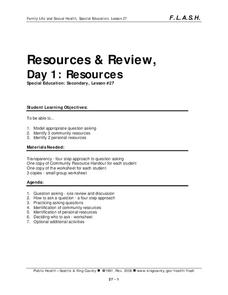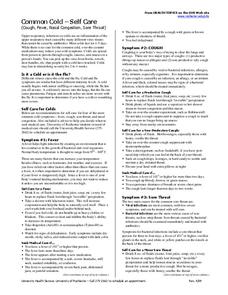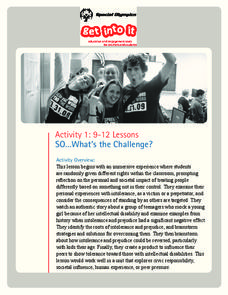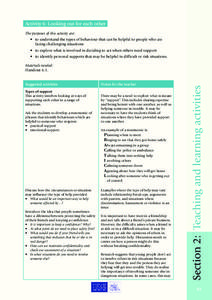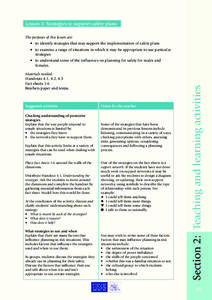Food a Fact of Life
Top Toastie
Croque-monsieur? How about pizza toast? Fire up the grill and show your young chefs how to prepare and enjoy these tasty offerings. The 13-page packet includes a rationale for the instructional activity, grocery and equipment lists,...
Food a Fact of Life
Getting to Grips
Fruit fusion or dippy divers, anyone? Here's a delicious way to introduce young cooks to aspects of safe food handling and the use of food handling tools. Groups create fruits and/or vegetable salads to share with the class.
King Country
Lesson 26: HIV/AIDS & Other STDs - Day 3: HIV/AIDS
The third lesson in the three-part series on HIV/AIDS and other STDs considers how these diseases are passed, how to protect against them, and risky and safe behaviors. The discussion of condom use and sexual behaviors are explicit.
King Country
Lesson 25: HIV/AIDS & Other STDs - Day 2: Sexually Transmitted Diseases
Sexually transmitted diseases (STDS) are the focus of a lesson that examines different types of STDs, how to avoid catching or transmitting these diseases, identifying the symptoms of STDs, and reporting procedures.
King Country
Lesson 24: HIV/AIDS & Other STDs - Day 1: Germs & Risk
This first lesson on sexually transmitted diseases focuses on germs, what they are, how they travel, and methods of protecting oneself from germs.
King Country
Lesson 28: Resources & Review - Day 2: Summary Session
To conclude the unit on family life and sexual health (FLASH), class members review the unit topics and reflect on what the have learned and accomplished.
King Country
Lesson 27: Resources & Review - Day 1: Resources
To conclude a unit on family life and sexual health (FLASH), class members use the skills they have practiced in previous lessons to develop strategies for getting information or help when they need it.
King Country
Lesson 22: Reproduction - Day 4: Sexual Decision-Making
This fourth lesson on sexual decision-making helps class members identify issues that should be considered before engaging in a sexual relationship. In addition, different types of sexual expression are discussed. The focus of the lesson...
King Country
Lesson 13: Communication - Day 6: Decision-Making
Decision making, including decisions that are made for us by others, decisions that are easy to make, and those that are not are the focus of a skill-building lesson that provides class members with a four-step decision-making model....
King Country
Lesson 11: Communication - Day 4: Hearing "NO"
"No!" Accepting a "No" response and handling rejection appropriately can be a challenge. After reviewing the previous lesson on asking for what they want, class members role-play appropriate ways of responding when their request has been...
King Country
Lesson 10: Communication - Day 3: Asking for What You Want
High schoolers practice appropriate verbal and non-verbal methods of asking for what they want in a lesson designed for the special education classroom.
King Country
Lesson 9: Communication - Day 2: Assertiveness
Appropriate assertive and non-verbal assertive communication is the focus of this lesson plan designed for the special education classroom. Using mirrors, class members practice assertive responses to a variety of situations.
King Country
Lesson 8: Communication - Day 1: Non-Verbal Communication
As part of their study of communication skills, class members practice using verbal and non-verbal techniques to appropriately express their feelings.
University of Rochester
Common Cold – Self Care
When kids enter school, they often bring home new illnesses. Decode their symptoms, and help them to take care of themselves, with a fact sheet about the common cold. It delineates the symptoms one would experience as well as the signs...
Choose My Plate
My Daily Food Plan (18+ years old)
Manage your calorie intake with a daily food plan journal. After reviewing a reference sheet with suggested amounts of each food group based on a total calorie pattern, learners can jot down what foods they have eaten during the day as...
King Country
Lesson 6: Relationships - Day 4: Friendships & Dating
Class members engage in a series of activities that encourage the development of the social skills associated with dating and sustaining friendships.
King Country
Lesson 5: Relationships - Day 3: Families
As part of a series of lessons on Family Life and Sexual Health (FLASH), designed for special education classes, high schoolers describe the members of their family and the role these people play in their life.
King Country
Lesson 4: Relationships - Day 2: Gender Identification
Gender roles and gender identity are the focus of a instructional activity designed for high school special education classes. Read the introduction to the packet carefully, as it contains advice about how to approach the subject with...
Special Olympics
SO…What’s the Challenge?
What does it feel like to be the victim of intolerance? Class members engage in activities, watch a video, and reflect on their own experiences with intolerance or discrimination before creating a project designed to combat intolerance...
King Country
Lesson 3: Relationships - Day 1: Self-Esteem
A sense of belonging, of being capable, of being appreciated, and the role these feelings have in our self-esteem is the subject of the third lesson in a family life and sexual health unit.
Safe Kids Worldwide
Pedestrian Safety Lesson Plan
Distracted pedestrians? Yes. This lesson on pedestrian safety points out the dangers of texting and posting while walking around traffic. In addition, kids learn about safety resources available for those on foot.
New South Wales of Education and Communities
Looking Out for Each Other
As a culmination of a unit on personal safety, class members develop mnemonics to help them remember ways they can offer practical and emotional support to others. In addition, they are asked to apply what they have learned in the unit...
New South Wales of Education and Communities
Developing My Personal Safety Plans
As part of a health unit on personal safety, partners work together to develop personal safety plans for specific situations they might faced in the future.
New South Wales of Education and Communities
Strategies to Support Safety Plans
Awareness, Avoidance, Distancing. Class members consider the types of protective strategies that would be appropriate in particular situations.








